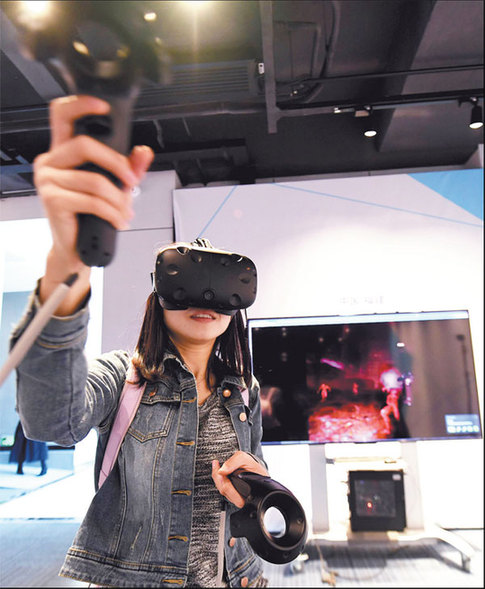Community is the killer app
I have played with several virtual reality systems over the last few years, but just recently bought my own PlayStation VR headset for my family. It's pretty whiz-bang. Although VR still has kinks (including motion sickness for many users), it's impressive how well even these first-generation consumer products convey what researchers call "presence", the feeling of truly being transported somewhere else. I have piloted Starfighters through dogfights, descended through a coral reef and walked through virtual theme parks.
If only it weren't so lonely in all these beautiful locales.
The social aspect of the internet and games has been my field of research for 15 years. I've run dozens of experiments and analyzed the "big data" of detailed play records from billions of gamers. What I consistently find is that the social aspect of a new technology - how it enables, restricts or encourages us to connect with each other - matters more than just about everything else.
Turns out that the best "content" is other people. When people get together in online games they may fight dragons or shoot lasers - but they are being entertained primarily by the other players. Even single-player titles beg to be talked about with others, so chat rooms, blogs and podcasts pop up around them.

When tech companies suddenly have a big hit, it's often because they got the social part right by accident. If we look at the most popular games of recent years World of Warcraft, League of Legends, Pokemon Go - they are each a sparkly excuse for playing with and being around others. You can find better graphics and better stories in their genres, but they aren't as much fun.
As a species, we're still basically social monkeys. Without others, we grow bored, restless, frustrated and sad. There's a reason that solitary confinement is such cruel punishment. So as new technologies emerge, the central question to ask is this: Does it help us enjoy one another, or get in the way? If you're looking for a basic test of which technologies will go big or fall flat, that's it.
Remember Second Life, the virtual world where we were all supposed to be building homes and careers by now?
It still exists, but it's a little corner of online space because it ultimately didn't do a great job of connecting people - at least not better than a phone call or an email. And of course you can look on any street and see the opposite result with smartphones, which nearly 70 percent of us now carry with us everywhere, precisely because they allow us to connect to each other so easily.
As I look out on the early VR landscape, I see very few developers making social VR spaces to compensate for those isolating headsets. There is a ton of investment flowing into VR companies, so surely a few will get it right. But while they work toward a breakout hit, a "killer app" to make VR systems a must-have, very few are focused on community.
Long-term, I'm not hopeful that the technology will become integral to our daily lives because the device isn't fundamentally social. I expect VR to be a lasting and vibrant, but ultimately very niche technology.
If there's a more positive sign for virtual technology, it's in the DNA of games such as Pokemon Go, which fall under the umbrella of Augmented Reality. These systems let you look at the existing world, but with another visual layer over it.
I walked around during the Pokemon Go boom and about every fourth person was hunting the animated creatures through his smartphone camera. They were outside, often playing with friends, and giddy. That looked to me like the start of something exciting, something that can be mainstream.
Augmented Reality could well spread into our business and social lives.
Imagine a foreman who looks at a stack of building materials and, through his AR glasses or contact lenses, sees the quantity, cost and where they fit into the overall design. A surgeon sees a tumor behind an organ. A singleton at a nightclub sees dating profiles for the other guests. There will be countless uses we can't yet imagine.
If you got a new VR headset as a holiday gift, by all means have fun. Some fantastic eye candy awaits. Just know that it's likely going to join your 3-D TV goggles in a drawer within the year. We are at the beginning of a whole new form of media that is going to have booms and busts. But eventually, some smart digital media designer will realize that the killer app is each other.
Los Angeles Times
社区才是最受欢迎的应用程序
过去几年,我曾试玩了几款虚拟现实游戏产品,但直到最近才为家人购买了一副属于自己的PlayStation虚拟现实头盔。这副头盔的游戏体验相当棒。尽管虚拟现实技术仍然有一些缺陷(包括引起很多用户出现晕动症),但其表现还是非常惊艳,甚至这些第一代消费型产品都能如此好地传递出研发者所说的“现场感”,那种身临其境的感觉。我曾“驾驶”着星际战斗机在空中激战,“下潜”至海底穿过珊瑚礁,也曾“逛过”虚拟的主题公园。
不过,要是感受这些美丽的场景时,不那么孤单该多好。
过去15年,网络和游戏的社交属性一直是我的研究领域。 我曾进行过几十次实验,并分析了数十亿游戏者详尽游戏记录的“大数据”。 我发现其中的一贯性是,新技术的社会属性,即它们推动、约束或鼓励人们相互联系的方式,胜于其他任何属性。
原来,最好的“内容”就是有他人。人们聚集到网络游戏上,可能去打怪龙或射激光,但他们主要是因为有游戏伙伴而感到愉悦。即使单人游戏玩家也渴望与他人聊天,所以聊天室、博客和播客才应运而生。
要是科技公司突然有一款游戏大卖,多半是因为它们碰巧把社交的部分弄对了。如果我们看一下近几年最受欢迎的游戏--《魔兽世界》、《英雄联盟》和《口袋妖怪GO》,就会发现,这些游戏为人们共聚玩乐提供了绝妙的借口。同类游戏中,不乏图像更精美、叙事更精彩的游戏,但却没有它们那么有趣。
做为一个物种,我们基本上仍然是社交性的动物。 如果没有同伴, 我们会感到无聊、不安、沮丧和悲伤。这就是为什么单独监禁是非常残酷的惩罚。所以当新技术兴起时,我们要问的核心问题是:它是会帮助我们更好地与他人相处,还是会阻碍我们彼此之间交流?如果你在寻找一个基本的测试方法来判定某项技术将来会发展壮大还是走向平庸,那么这个问题就是答案了。
还记得那款 《第二人生》 的虚拟游戏吗?那款我们曾以为一直会在其中营造家园、开展事业的游戏。
它依然存在,但已经淹没在浩瀚的网络游戏中,因为它根本没有很好地把人们联系起来,至少没有比打电话或发邮件更好。手机更是如此,你看大街上七成人随时随地拿着智能手机,就是因为这样极易彼此联系。
纵观早期虚拟现实领域,我很少看到开发者去提高虚拟现实的社交功能,去弥补那些孤立的头盔所存在的不足。大量资金投入到了虚拟现实公司,所以肯定会有一些公司能找对方向。但当他们在努力开发一款突破性的热门产品,一款“备受欢迎的杀手级游戏”,促使虚拟现实设备成为必备商品,很少有人去关注社区。
长久以来,我对技术融入日常生活并不抱有希望,因为电子设备从根本上来说不具有社会性。我希望虚拟现实能成为一种长久存在、充满活力,但最终非常专业的技术。
如果虚拟技术的发展有一个更积极的迹象,那么这个迹象就存在于像《口袋妖怪GO》这类游戏的基因中。这类游戏应用的是增强现实技术,会让你去探寻外面已存在的世界,但却在其上增加了视觉层。
在《口袋妖怪GO》游戏最火的时候,我走在外面发现每四个人中就有一人在通过他的智能手机摄像头,捕捉那些动画生物。人们在户外,通常和朋友一起玩,简直开心得发狂。在我看来,这应该是好兆头,有吸引力,能发展成为主流。
增强现实技术可能真会广泛渗透到我们的工作和社会生活中。
(本段的翻译有奖征集中)

如果你收到了一副新的虚拟现实头盔作为节日礼物,那么请务必好好享用。一些精彩迷人的游戏正等着你呢。要知道,很可能一年内你就会把它和你的3D电视眼镜一同扔进抽屉。我们正处在一个全新媒体形式的初期,这个阶段会经历繁荣和萧条,但最终,一些聪明的数字媒体设计师会意识到,真正受欢迎的应用程序是我们彼此。
上期获奖者:广州 华南师范大学 林晓怡
翻译高手:请将蓝框标注内容翻译为中文,在1月16日(周一)中午12点前发送至youth@chinadaily.com.cn,请注明姓名、学校、所在城市。最佳翻译将获得精美礼品一份,并在下周三本报公众号中发布。


















